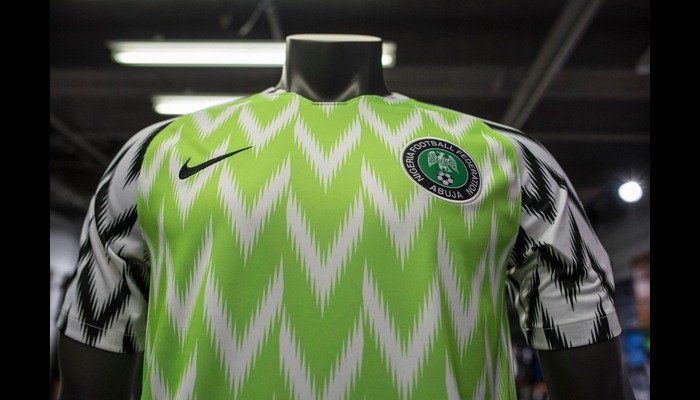At the 2018 FIFA World Cup in Russia, Nigeria’s Super Eagles didn’t just impress with their youthful energy on the pitch; they became global style icons. Their home kit, a bold fusion of fashion and national pride, ignited a worldwide frenzy and redefined how football jerseys are perceived and marketed.
An Instant Global Phenomenon
Unveiled by American sportswear giant Nike on June 1, 2018, Nigeria’s World Cup kit was an instant sensation. Drawing inspiration from the Super Eagles’ 1994 World Cup debut, the design featured a vivid green torso and distinctive black-and-white feathered chevrons on the sleeves, a bold reinvention of the traditional strip.
Read Also: NIKE confirms 3 million orders for Super Eagles jerseys
Demand skyrocketed. Nike reported over three million pre-orders before launch. When it finally hit stores, it sold out within minutes online and at retail outlets worldwide. At Nike’s flagship store in London, fans queued for hours. UK-based Nigerian Helen Otitochukwu Manufor recalled, “I waited for two and a half hours, but by the time it got to my turn, it was sold out. Even when I came back the next day, it was gone again.”
Read Also: ‘I spent two-and-half hours on the queue to get Super Eagles’ jersey’
A Cultural Milestone in Sportswear Business
Retailing at £64.95 ($88.35), the jersey quickly became a collector’s item, with resale prices doubling or tripling within days. For the first time, a football kit mirrored the hype and scarcity usually seen in sneaker culture.
Doug Bierton, CEO of Classic Football Shirts, called it “the first football shirt to have a drop moment that transcended football.” Demand split beyond sport, into fashion circles and urban streetwear, turning the jersey into a cultural symbol.
Read Also: Overview of all 2018 World Cup jerseys
Design Innovation and Cultural Identity
Widely hailed as the best kit of the tournament, the jersey ranked fifth in a BBC poll of the greatest football shirts of all time, trailing only iconic designs from Brazil, the Netherlands, West Germany, and England.
Led by designer Matthew Wolff and Nike’s senior design director Peter Hoppins, the kit tapped into deep cultural roots. Inspired by Adire, a traditional Yoruba tie-dye textile, it was both fashion-forward and culturally rich.
“It was a bold reimagination of Nigerian identity, joyful, proud, and unapologetically vibrant,” Hoppins said. Nike described it as “a tribute to Nigeria’s bold culture, energy, and confidence.”
A Fan Frenzy Like No Other
The hype extended to matching gear — track jackets, bucket hats, and shorts — all of which sold out instantly. From Lagos to London to New York, long queues and disappointed fans were common.
Modupeola Adebukola, another UK-based Nigerian, shared: “Everyone wanted the Nigerian wears. The queue stretched endlessly, and we still couldn’t get it after hours.”
Legacy Beyond the Group Stage
Though Nigeria exited in the group stage, the kit’s legacy endured. The Super Eagles’ youthful squad, featuring Ahmed Musa, Alex Iwobi, and Wilfred Ndidi, delivered memorable moments, especially Musa’s brace in the 2–0 win over Iceland.
“That game against Iceland was special,” said sports marketer Desmond Ebohon. “When we beat them, I said: ‘They are not giant killers — it was just England being bad.’” Musa also scored against Argentina, but a late goal from Lionel Messi sealed Nigeria’s exit.
The Kit That Changed the Game
The 2018 Nigeria World Cup jersey transformed how the world viewed football kits. Not just sportswear, but it was a statement of culture, confidence, and cool. Even today, it remains a highly coveted item in resale markets and a case study in successful brand storytelling.
“Every team now wants a Nigeria moment,” said Bierton. “But what happened in 2018 was organic, authentic, and unforgettable.”

